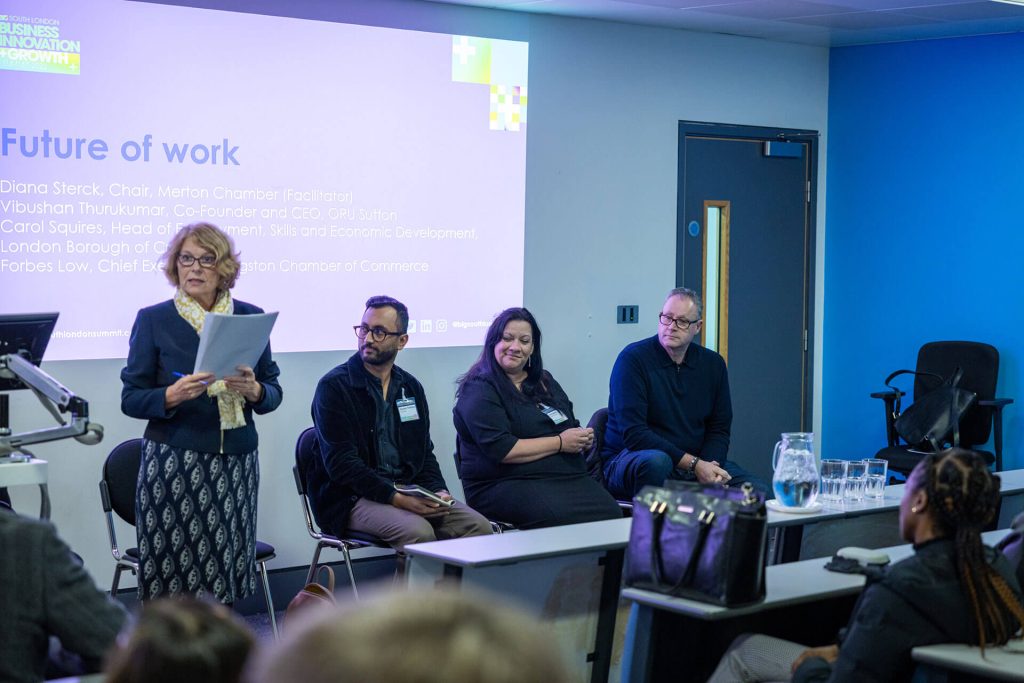Breakout session: Future of Work
Panellists: Diana Sterck, Merton Chamber of Commerce; Vibushan Thurukumar, ORU Sutton; Carol Squires, London Borough of Croydon; Forbes Low, Kingston Chamber of Commerce
Trailblazing coworking space and accessible, inclusive opportunities for all are laying the foundations for the workplaces of the future, experts discussed at the BIG South London Business Innovation & Growth Summit.
The ‘future of work’ breakout heard from Vibushan Thurukumar, co-founder and CEO, ORU Sutton, who explained how his company is delivering a unique 40,000 sq ft coworking space in Sutton Town Centre.
The ORU development has a coworking capacity of 600, as well as two studios, a restaurant and a range of activities in partnership with Age UK and local schools.
Mr Thurukumar said: “It’s predominantly a coworking space, but we’re merging the industries of hospitality and wellbeing into what we think delivers a really high-quality space so that innovation can happen and people cannot just work together, but actually network. That happens through activities, high-quality hospitality and leisure.”
He added: “Coworking is part of the flexible economy. Our economy is moving faster than it ever has before. When you sign a fixed lease for your company, the moment you sign it, the space is either too small or too big. A flexible economy and coworking space allow you to grow or downsize as and when you need to. It also allows you to focus on what your business needs, to energise your confidence and increase the chance of success, rather than focusing on the plumbing, the toilets and all that stuff.”
Carol Squires, head of employment, skills and economic development, London Borough of Croydon, welcomed coworking space, saying: “Businesses are demanding something different, and we have seen such an acceleration of change in the way we work and what we want, and that flexibility is key. People aren’t wanting to sign long leases anymore. We do have a variety of workspaces in Croydon and they’ve had to become more flexible about their approach.
“Our inward investment team have seen a really huge rise in enquiries from businesses inside central London looking at downsizing. We are also seeing enquiries from large companies outside the borough who are looking at where their staff live and, once or twice a week, would like to get into a co-working space.”
Forbes Low, chief executive, Kingston Chamber of Commerce, welcomed the spaces but said it wasn’t always affordable for businesses. In Kingston, 88% of businesses are small or micro.
He explained: “I used to work in a serviced office and found that community sense of businesses around you incredibly productive, so I’ve always been a great advocate of workspaces. Increasingly, it comes down to affordability and flexibility and I think there’s still a bit of a disconnect. I would say if I look at some of our members, in terms of what they could afford in relation to what a business operator is actually offering, there’s got to be something which bridges that because at the moment, it’s just too much.”
In contrast to the concern about working from home causing isolation for workers, a Croydon Vision representative explained how working from home had allowed a “lot of blind people and disabled people to stay in employment because travelling on public transport into the city is sometimes the biggest barrier to working, and working closer to home means that they might possibly apply for jobs”.
Panel facilitator Diana Sterck, chair, Merton Chamber, welcomed a “level playing field for people that have disabilities,” adding: “Wouldn’t it be lovely to have these clusters, really workspaces, where we know businesses are emerging and we can harness the skills of many, many talented people.”



